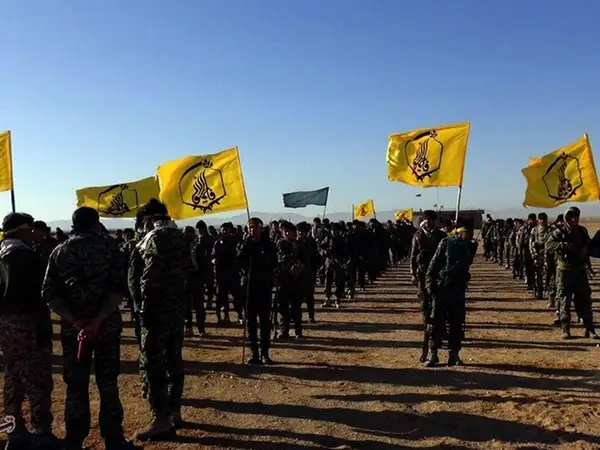Iran International has obtained information that reveals corruption in salary payments to proxy militia fighters in regional countries by their Revolutionary Guard handlers.
IRGC Brigadier General Jamaleddin Aberumand, who is currently serving as an aide to Parliament Speaker Mohammad Bagher Ghalibaf (Qalibaf) and was a former deputy commander for IRGC coordination affairs, has appropriated parts of the salaries that the IRGC meant to pay to its militias in countries such as in Syria and Yemen.
Aberoumand was the head of IRGC Bonyad Cooperative, an entity also known as the Cooperative Foundation of the Revolutionary Guard and under US Treasury Department sanctions since December 2010. He was apparently in charge of paying the salaries of IRGC Quds (Qods) Force militias-- a division responsible for extraterritorial military and clandestine operations.
Zainebiyoun Brigade -- recruited mainly from Shia Pakistanis living in Iran – and Fatemiyoun Brigade – recruited from Afghan refugees in Iran and Afghanistan – were formed in 2014 to fight in Syria along with President Bashar al-Assad forces. These forces, along with Houthis in Yemen and Hezbollah forces in Lebanon are some of the forces that are in fact employed and regularly paid by the IRGC.
A senior IRGC commander, who talked to Iran International on condition of anonymity, says the Fatemiyoun, Zainebiyoun and Houthis were paid a monthly salary of $700 in 2018 but the figure has been reduced in recent years. By 2022, the militiamen are paid about $100 to $200 per month. According to this information, Hezbollah fighters receive the highest salaries among the proxy forces, at about $1,300 per month, while the maximum salary of IRGC proxy forces in Syria is $250, and the Yemeni Houthis receive $100 a month.
However, the catch is that although they are paid significantly less than their earlier salaries, Aberoumand – and probably other IRGC commanders working with him – report much higher salary expenses to the government and pocket the difference. The source told Iran International that they overcharge the government to the tune of $500-1000 per month per fighter. The amount lost in the alleged corruption scheme runs into hundreds of millions dollars a year.
According to unconfirmed reports, the Quds force has more than 200,000 forces across the Middle East although the number the IRGC is eager to admit is about half of that. Therefore, to provide the money needed for the salaries of the undeclared forces, the country manipulates the budget figures to make up for the difference.
In early 2022, an audio file of a meeting of IRGC commanders was leaked that revealed that Aberoumand played a key role in a corruption case at Tehran municipality of about 13 trillion rials ($440 million at the exchange rate then), indicating financial irregularities that took place under the watch of Ghalibaf when he was the capital’s mayor from 2005 to 2017. The irregularities may have been a way to provide for the salaries of the Quds forces. Several officials and advisors close to Ghalibaf were arrested over the case but not Aberoumand. In January 2018, a then-City Councilor Majid Farahani disclosed that $5 billion of Tehran’s municipality funds went missing during Ghalibaf’s tenure.
Part of the recording directly implicated Ghalibaf, former Quds Force Commander Qasem Soleimani, Aberoumand, and then Chief of the IRGC Intelligence Organization Hossein Taeb in covering up the embezzlement of 80 trillion rials (around $3 billion at the time) between Tehran municipality and a firm controlled by the IRGC -- Yas Holding.
In the recording, it is revealed that Ghalibaf suggested the IRGC and Tehran Municipality sign a false contract for the same amount to justify the disappearance of the money. An official is heard saying that Khamenei had ordered 90 percent of the money earned by Yas Holding to be used to finance the Quds Force and the remaining 10 percent to go to the IRGC for its general needs.
To prevent such fiascos in the future, the current administration has come up with a new remedy in the country’s state budget. In the budget bill for the next Iranian year, which starts March 21, the government has granted new permits to some departments such as the General Staff of the Armed Forces and other regime entities to sell oil products on behalf of the government and earn some of the income.
According to the Note 1 of the bill – titled “Oil and its relations with the government” -- the National Iranian Oil Company is obligated to deliver “crude oil and gas condensates” to entities introduced by the executive bodies. As per the new measures, the General Staff of the Armed Forces is given the authority to sell and refine oil up to €4.5 billion. It means that the Armed forces can give crude oil to refineries and receive products that should be exported.
